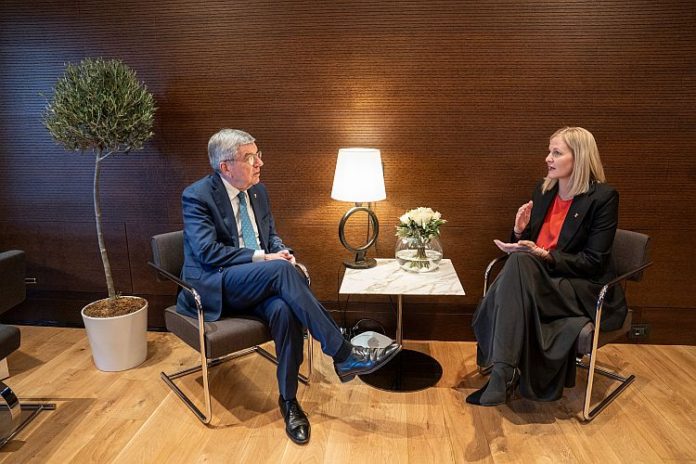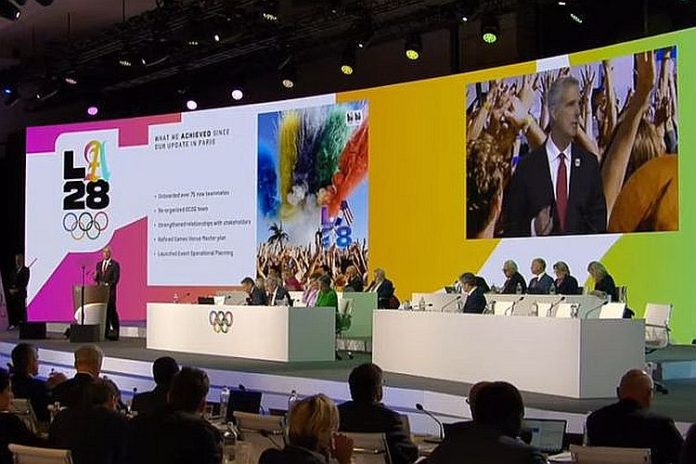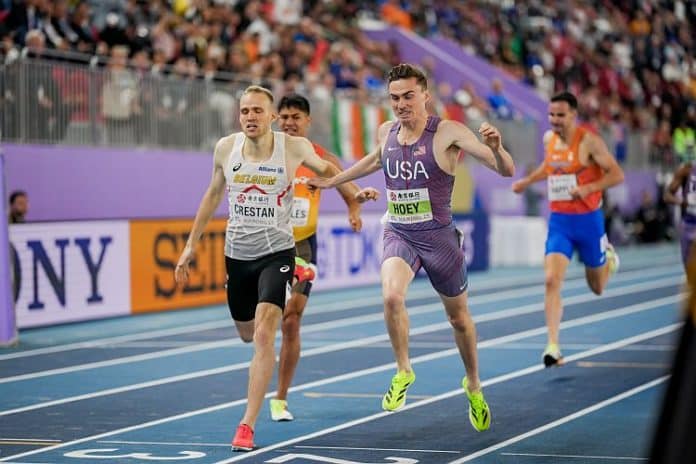★ The Sports Examiner: Chronicling the key competitive, economic and political forces shaping elite sport and the Olympic Movement.★
★ To get the daily Sports Examiner Recap by e-mail: sign up here! ★
≡ IOC PRESIDENTIAL ELECTION ≡
Speaking to the online 140th Session of the International Olympic Committee in June 2023, IOC President Thomas Bach (GER) told the members:
“In this way we are applying our core values of peace, unity, solidarity and nondiscrimination to find a pathway that serves the interests of the athletes.
“Our values are not just abstract concepts.
“Because at the end of the day, it is all about the athlete. This is where our values become real. This is why our principles matter. We are here to support the athletes of the entire world to make their Olympic dream come true.
“This is why we promote the participation of every athlete who accepts the rules, respects the Olympic Charter and has qualified on the field of play. The athlete is at the heart of the rationale for our recommendations.”
Bach’s relentless, repetitive reminders about the importance of having athletes at the center of what the IOC does, was coupled with his immovable belief in the future of the Olympic Movement as expressed during his remarks at the Paris 2024 opening ceremony:
“All of us will experience Olympic Games that are more inclusive, more urban, younger and more sustainable: the first Olympic Games with full gender parity on the field of play.”
These concepts were the basis for Zimbabwe’s Kirsty Coventry to win the IOC Presidency on 20 March, getting the minimum number of votes needed for a first-round win – 49 of the 97 cast – with Juan Antonio Samaranch (ESP) second with 28 and then Sebastian Coe (GBR) a distant third with eight votes. Four others received between 2-4 votes each. Consider:
● Coventry and Coe were the only Olympians in the election. Coe won two golds (1,500 m) and two silvers (800 m) in 1980 and 1984; Coventry was in a remarkable five Games – 2000-04-08-12-16 – and won seven medals (2-3-2), all in 2004 and 2008.
In less than 10 years after her last Games in the pool, she was elected IOC President. In Bach’s words: an athlete, younger (at 41, the second-youngest IOC chief ever), with gender parity and continental parity as the first woman and first African to lead the IOC.
● The IOC was ridiculed for decades as an old boys club, with a few ex-athletes along the businessmen, millionaires and royalty. Major change was already underway during the time of President Juan Antonio Samaranch (ESP) from 1980-2001, but Bach accelerated everything during his 12 years in office.
● Of the 109 IOC members coming into the 144th Session in Greece, 43 had participated in the Olympic Games (39%), including 13 of the 35 elected before Bach took office (37%).
● Of the 74 members (of the 109) who had been elected during Bach’s term in office, 30 were Olympians (41%), and several more were former athletes who had not made it to the Games.
● Coventry is the fourth IOC President – out of 10 – who was an Olympian, starting with Avery Brundage (USA) in 1952, then not until Jacques Rogge (BEL: sailing) in 2001, then Bach (GER: fencing) in 2013 and now Coventry (swimming). That’s three Olympians in a row, two Olympic champions in a row and Coventry comes in as the most athletically-decorated IOC President ever, as the winner of seven medals, and participation in two Games.
● On gender, the 109 members split 61 men and 48 women coming into the 144th Session. Of the 35 pre-Bach Presidency members, 13 were women (37%).
● During Bach’s term (up to the 144th Session), 35 of the 74 elected members were women, or 47%.
Those two elements of Bach’s 12-year term – elevating the number of athletes and women – were the demographic building blocks of Coventry’s 49 votes and her first-round victory.
Israeli member Yael Arad, the country’s first Olympic medal winner – a women’s 61 kg silver in judo in 1992 – and elected to the IOC in 2023, told TSX correspondent Karen Rosen:
“I think it’s big history for the Olympic Movement. I think with great candidates with a lot of experience and two of them were Olympic champions, and I think for many of us it counts to be with a lot of skills and experience, but also really come from the bottom of the heart of the sport.
“And I think a woman that brings a lot of ambitions and skills, it’s a great message, not only to the world of sport, but also to the world at large, where everybody can, if you just dream and you work hard enough and you believe in yourself and people believe in you, so you can make it.”
Arad’s point on experience is also key. The top two vote-getters had been IOC members for some time – Coventry since 2013 and Samaranch since 2001 – with four of the five others elected in 2018 or later. Morinari Watanabe (JPN) was elected in 2018, Coe in 2020, David Lappartient (FRA) in 2022 and Johan Eliasch (GBR) in 2024. That was also a factor.
¶
Although there is a transition period coming now, with Coventry to take office on 24 June 2025, Bach made it clear in his news conference on Friday that Coventry is essentially already in charge:
“With regard to the partition of responsibilities, I have assured her that from today on, no decision will be taken over her head, that this will happen in full consultation, and if there are different opinions between her and me, her opinion will prevail.
“It’s then her call to make these decisions, because she will have to live, then, from 24th of June, with these decisions, and to make this as efficient as possible, we have already fixed the first Executive Board meeting on the first day of her mandate on 24th of June, so that in case there are complex decisions to be taken which may need further consultation, or for which we need the approval of the Executive Board, then we can postpone it until then.
“And we have [an] interim, already another Executive Board on the 9th of April, so if by then, there would be decisions that we could take there on the 9th of April and this will be a remote meeting.”
Bach explained that in the handover period, Coventry will meet with each of the IOC staff departments – the presentations are already being prepared – so that she will be up to speed and ready to start her term.
¶
Coventry was asked in her news conference as President-elect, on her first priorities and on current hot-button issues, and she was well prepared:
● On Russia and Belarus, with the 2026 Winter Games coming up, she maintained Bach’s line that athletes should not be denied opportunities to compete simply because of their passport:
“I believe at the end of the day, we need to do anything and everything to protect and support athletes from all conflict areas. We have numerous conflicts and a number of them happening on my continent.
“So again, we need to sit down as the Olympic movement and have a very serious conversation around how are we going to deal with more and more conflicts and how are we going to protect and support athletes that are coming from these conflict areas.”
The question of political neutrality by athletes was closely considered by the IOC prior to the Paris 2024 Games. It will be up to Coventry to lead the discussion on whether this will be maintained for Milan Cortina.
● On the transgender participation question, Coventry said there is work to do:
“I want to work together with the international federations. I want the IOC to take a little bit more of a leading role. And we’re going to do that by setting up a workforce, a task force that will look and analyze everything. We don’t need to redo the work. The IFs have done the work.
“But we are going to bring everyone together, sit down and have a little bit more unity in the discussion … [on] the transgender issue and the protection of the female category. And we, once we’ve made the decision collectively as the IOC with the international federations, that decision will be made very clear and we won’t move from that decision.”
She also believes that working with U.S. President Donald Trump is more a matter of communications than anything else, as she noted “[t]hat is something that will happen early on. My firm belief is that President Trump is a huge lover of sports. He will want these Games to be significant. He will want them to be a success.”
Coventry said that one of her short-term efforts will be to meet with the other six candidates and to “bring all candidates together and sit down and share some of these ideas that we’ve all had. And put them down on paper and agree on a way forward. So we will be able to look at ideas like this and what that could potentially mean and then take it to the broader membership.”
All seven candidates promised more interaction with the membership than seen under Bach and this will be the first step forward in keeping that promise, and meeting the known and unspoken expectations of those who her into an office which will have worldwide impacts. Coventry said:
“[F]irst and foremost, I’ve never ever been successful as an individual. I’ve been successful because of a team. And what I’ve learned most over the last six months is I have an incredibly strong team within my membership.
“They are incredible people with many experiences, a lot of knowledge. And I’m going to lean on all of them. We’re going to make decisions together. We’re going to support each other. And for me, that’s the only way that I’m willing to work.”
Rich Perelman
Editor
★ Receive our exclusive, weekday TSX Recap by e-mail by clicking here.
★ Sign up a friend to receive the TSX Recap by clicking here.
★ Please consider a donation here to keep this site going.
For our updated, 895-event International Sports Calendar for 2025 and beyond, by date and by sport, click here!
























